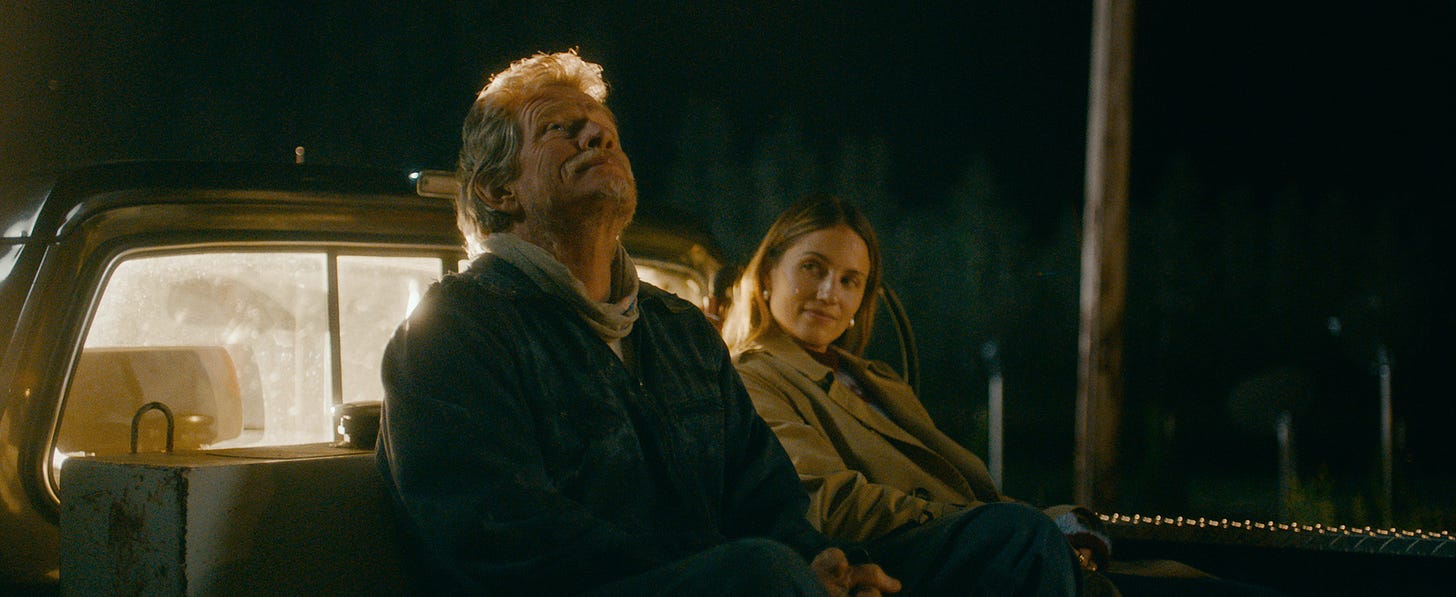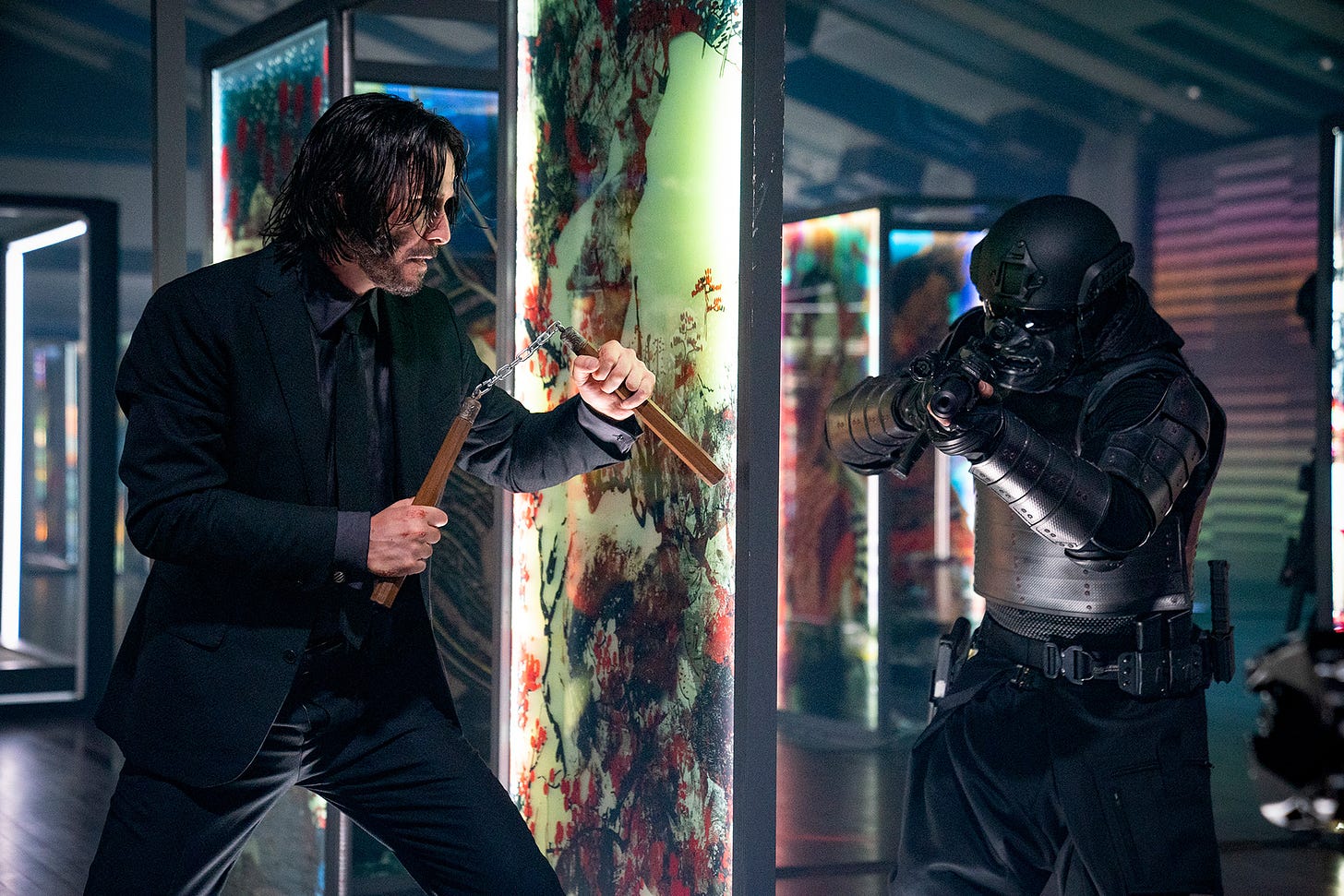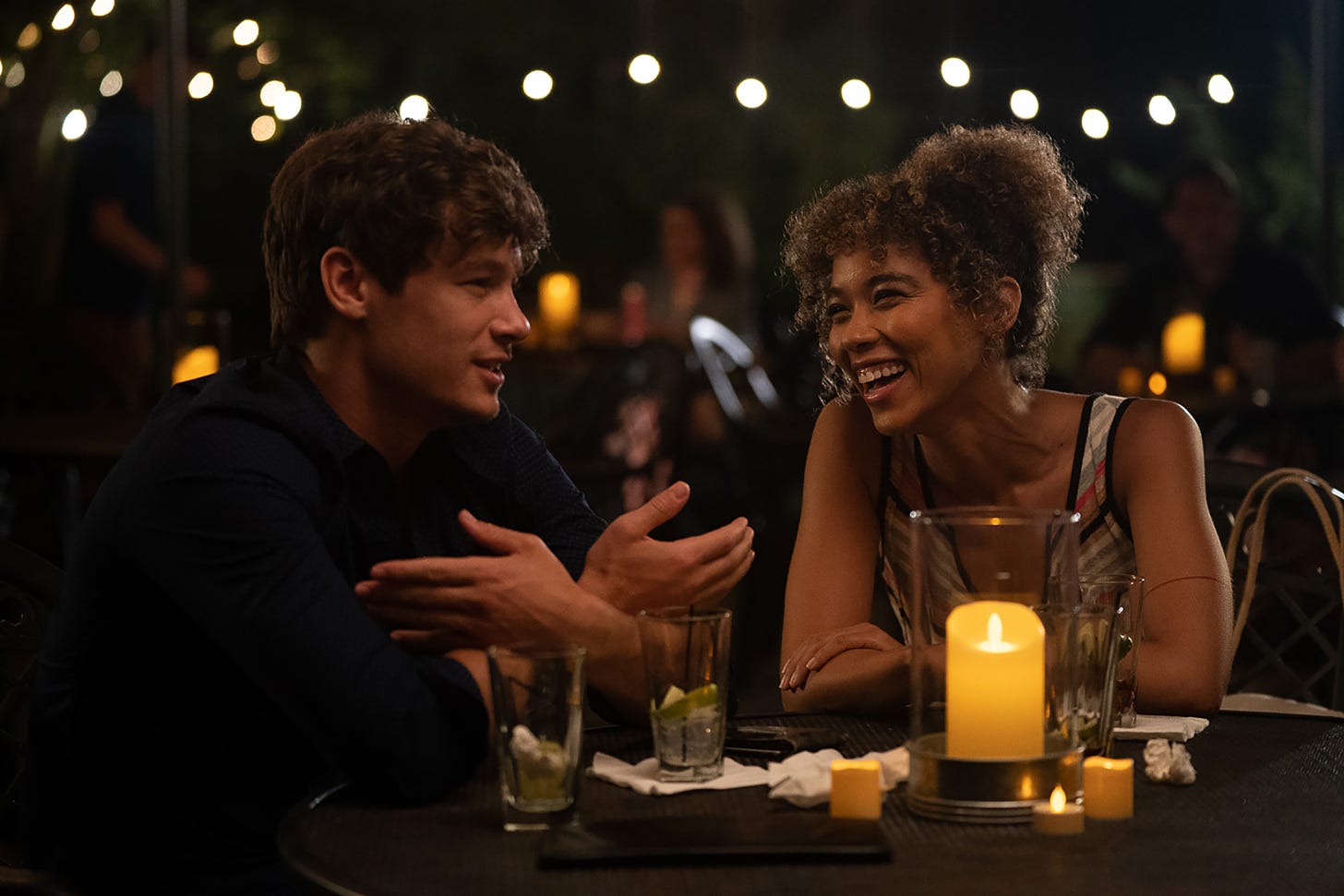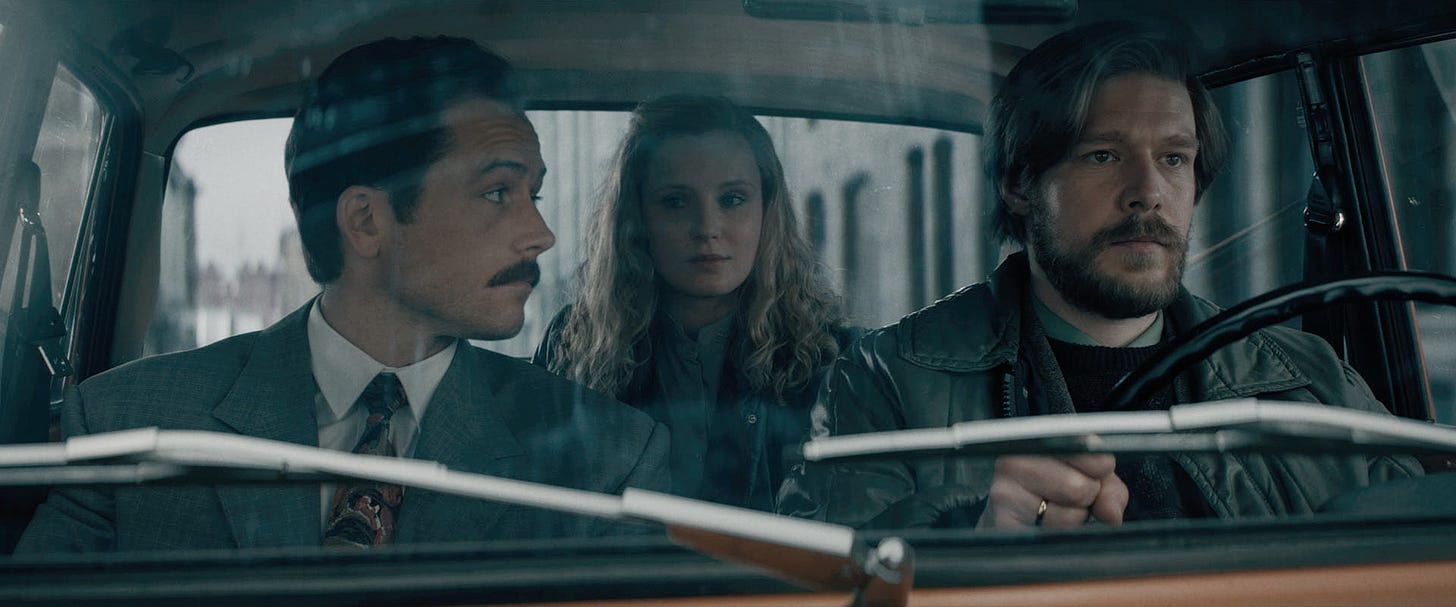In preparation for Easter weekend, two new films are releasing on Wednesday for members of the whole family. So, don’t just assume today’s new slate is it. While the kids suffer through or enjoy Chris Pratt’s Mario (the debate has been heated—one where I say stunt casting as a whole should be abolished since there are literal voice actors who can voice act circles around celebrity A-listers), Mom and Dad can catch Affleck’s Oscar hopeful AIR about Nike’s courtship of Michael Jordan and the subsequent Air Jordan sneaker phenomenon.
It’s interesting because DUNGEONS & DRAGONS could potentially be the hit Hollywood needs for the holiday the way reviews have gone so far. Whether that buzz is enough to get people in theaters for a table-top game adaptation remains unknown, though. Between older grandparents still lost in the Satanic Panic 1980s and newfound fans of the property courtesy of STRANGER THINGS, who knows what to expect? Paramount has their fingers crossed for a hit. Universal has Mario waiting in the wings to pounce either way as the “shinier” title only five days later.
What I Watched:
ACIDMAN
(now in limited release and on VOD)
Director Alex Lehmann and co-writer Chris Dowling could have introduced Maggie (Dianna Agron) just as she’s pulling into her estranged father’s (Thomas Haden Church) driveway, but instead decide to let us meet her alone first—sitting in a diner, visibly distraught, with the waitress (Sameerah Luqmaan-Harris) making sure she’s okay before walking away. It’s brief but important. Maggie’s cell phone rings and she ignores it. It rings again while driving and she does the same. So, rather than pretend like ACIDMAN is about reconciliation, we know straight away that it’s actually about understanding. Because while it would be nice to perhaps mend fences with the parent who ran away decades ago, she could have tried finding him any time before. To do it now, while presumably running away herself, means the answers she currently seeks lie within.
I won’t give away why this is true since the film uses it as a climactic reveal, but knowing there’s a motivating factor to Maggie’s struggle helps us engage with the story in a way that ensures we aren’t constantly wondering when she’s taking him to a hospital. That’s the trajectory this journey usually takes: Maggie discovers her father is unhinged (prone to disengaging with the moment and caught up in a fantasy that alien life is communicating with him), tricks him into seeing a doctor, and gets him on the medication that makes him what she needs him to be. But that’s boring. Familiar. Reductive. Because he’s not doing any harm. You could say he left precisely so he wouldn’t. The question is therefore whether she can allow herself to reconcile these identities. Can she learn something from his regrets without demanding he learn something too—something he surely already knows?
That’s a concept with which too many films refuse to engage. This idea that people don’t have to be fixed. The quickest way to finally being able to accept yourself is to allow yourself to accept others as who they are regardless of how it runs counter to societal norms and your expectations. This man obviously wants to communicate. He wants so desperately to be listened to without judgment that he takes his voice to the stars. He’s alienated himself because he believes the world has alienated him. So, for Maggie to see that and know she isn’t that far removed despite having the awareness and clarity of self-reflection thanks to his example, it’s not difficult to simply give him what he needs. Because indulging him hurts no one. But its impact upon his existence is profound. It reminds him he isn’t alone.
And it reminds her that she isn’t either. All the anxiety, frustration, and fear that drove her to this point doesn’t make her defective. It doesn’t mean she must also become a pariah. She can forgive him and embrace the fact his struggles cannot be erased with a flip of a switch. That love doesn’t demand solutions as much as patience and empathy. Church delivers one of his best performances (his final scene is unforgettable) as a gentle yet unpredictably scatterbrained crackpot with an intense desire to be heard, but it’s Agron who steals the show with an emotionally charged thaw from guarded uncertainty to compassionate relief. Maggie is so desperate to prove she isn’t her father that she forgets there’s so much of his she’d aspire to possess. It’s all still present when he isn’t pushed into a corner. So, it must just exist in her if she stops pushing herself into one too.
- 7/10
A-HA: THE MOVIE
(now streaming on Viaplay)
It’s insane to think that “Take On Me” was a-ha’s very first single. The song was so big that most people consider the band a one-hit wonder despite eleven studio albums—the latest from last October despite Thomas Robsahm and Aslaug Holm’s documentary A-HA: THE MOVIE all but making it seem like they’d never record again. Talk about impossible expectations regardless of the usual artistic desire to break free of molds dictated by money, media, and personal aspiration. The fact they made a second album at all is a testament to a few lines spoken towards the end of the film that admit they didn’t originally come together as friends. Whether or not they became such, it was always about the music. So, despite feelings and grudges pulling them apart multiple times throughout the past four decades, that respect in each other’s talents can’t help bringing them back together.
This movie is therefore an intriguing one because of how different their story progresses from the usual rock-n-roll tales of drugs, sex, and ego. Their trajectory was never about fame and fortune. Both Pål Waaktaar and Magne Furuholmen admit that they aren’t sure things would have continued if lead singer Morten Harket didn’t embrace and absorb the brunt of the attention so they could focus on the songwriting behind the scenes. It’s honest soundbites like that which makes the trio an utterly captivating subject since they aren’t ever playing to the camera or wondering how to diplomatically admit some unspeakable truth. They know who each other is. They know they can each be difficult and when it’s not worth fighting about it. And they deal with it because the end result is worth the pain.
It’s a refreshing bit of self-awareness and self-reflection that the industry could use more of even if there’s a couple mentions of the band needing a therapist to work through their deeper-seeded issues. Part of it probably comes from the maturity of understanding the music mattered most. Part of it is probably the emotional maturity that comes from two of the band members already being in relationships with the women they’d marry when signing their first contract. They’re grounded. It’s surely no coincidence that they also hail from Norway and hold different cultural and societal imperatives than American kids using the music to gain celebrity. Add numerous conversations about image, evolution, and mistakes and the film provides an informative portrait that excels despite its lack of stereotypical Drama. As they say, no one cares about the arguments but them. The songs are what get remembered.
- 7/10
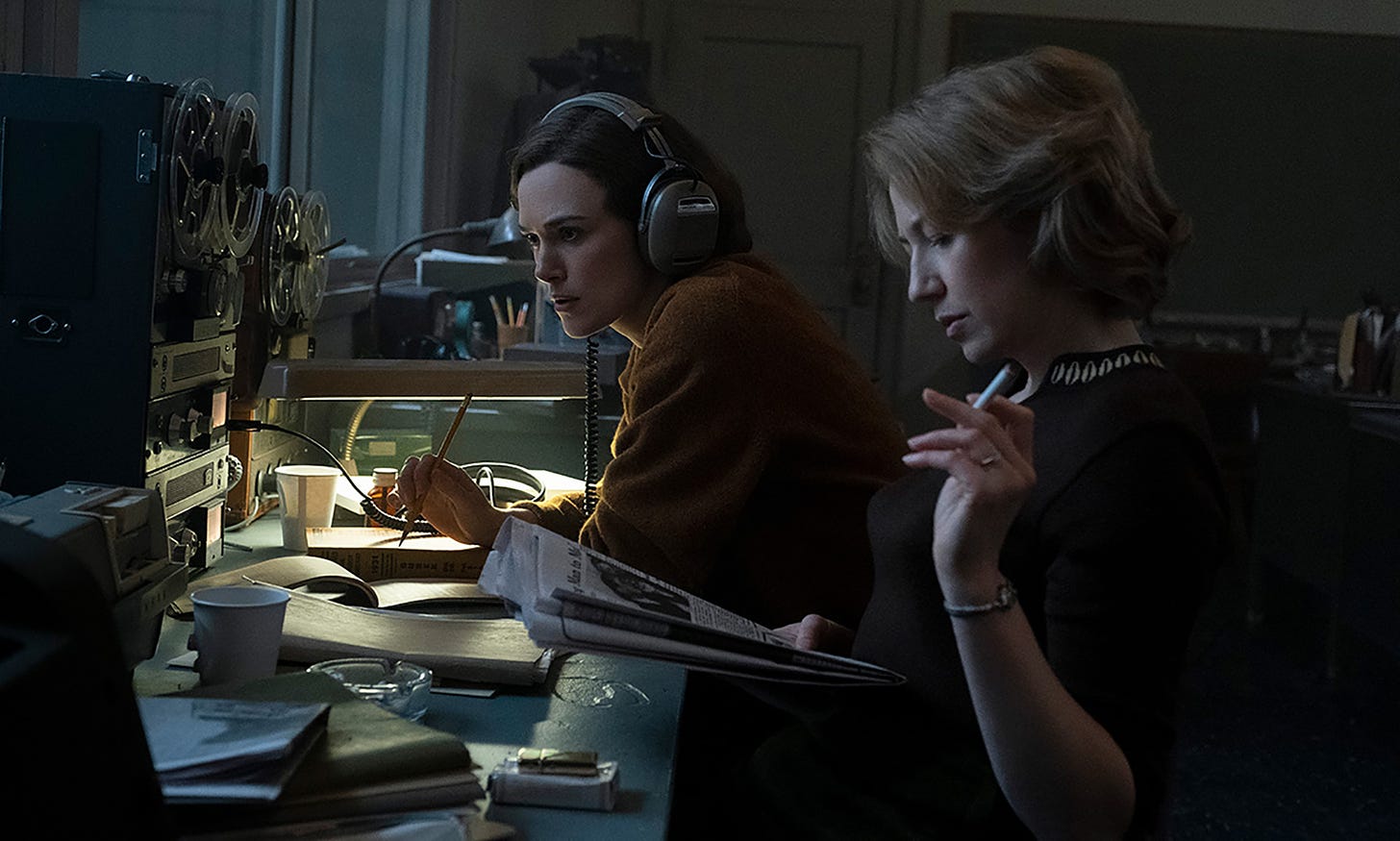
BOSTON STRANGLER
(now streaming on Hulu)
As someone unversed in BOSTON STRANGLER lore, it was nice of writer/director Matt Ruskin to begin things in Ann Arbor, MI. By letting the first murder he shows us be somewhere else before rewinding three years to bring us to Boston, he prepares us for the chaos that ensues as far as an overworked and poorly managed police force is concerned. Because while Loretta McLaughlin (Keira Knightley) and Jean Cole (Carrie Coon) continue to find leads for each subsequent murder (five elderly women shifting to eight younger ones), Commissioner McNamara (Bill Camp) refuses to acknowledge his ineptitude. So, we can’t ever believe any single solution if every possible solution seems plausibly correct. Eventually, the idea that there was only one killer becomes the most far-fetched assumption of them all.
It’s a tough story to tell as a result. You can’t commit to focusing on the murderer or the victims. You can’t commit to focusing on the police. In the end, eleven of the twelve murders remain unsolved today. The only through-line then is the reporter who used to collect crime clippings from other newspapers as a means of showing her boss (Chris Cooper’s Jack Maclaine) that his “crack” team wasn’t up to the task. Loretta happens to see a potential connection between three homicides, deftly maneuvers her way through their respective cases to confirm (each was strangled and left with a knotted scarf around her neck), and finally convinces the naysayers that her story has legs. Add Jean for legitimacy, Detective Conley (Alessandro Nivola) for off-the-record info sharing, and frustrated cops from neighboring precincts and other states who are unable to get Boston PD to call them back and the puzzle pieces begin to fall in place.
The whole is a solid if non-descript true crime thriller looking to find the lightning in a bottle of other newsroom films such as ZODIAC or SPOTLIGHT. It might not reach those heights due in part to the continued mystery surrounding the murder spree, but it maintains intrigue thanks to an effectively determined Knightley. We’re on her side throughout, even as the mounting stakes take a sledgehammer to her marriage (Morgan Spector’s James is a supportive husband … until he’s not). I would have liked more time spent on that effect since those domestic struggles are mostly pushed to the background as hollow tension, but Knightley’s performance embodies the psychological cost regardless. Ruskin is balancing her narrative with the case as best he can until the latter renders the former moot. Some of the more nuanced drama feels incomplete as a result, but not enough to derail the rest.
- 7/10
ENYS MEN
(now in limited release)
What if THE LIGHTHOUSE, but with SKINAMARINK vibes. And not with Robert Eggers at the helm, but Ben Wheatley. Those are the touchstones that kept coming up while watching Mark Jenkin’s deliberately paced folk horror ENYS MEN. It therefore made sense to learn the whole was shot without an interest in sound before being reconstituted in post with new voices, folly, and score. The deafening static and auditory scramble becomes an aesthetic choice much like Kyle Edward Bell’s child height abstraction of sight. Jenkin is putting us into a headspace steeped in uncertain reality wherein we can never trust what it is we’re seeing. Just like the repeated close-up of Mary Woodvine on a flattened stone “step” causing me to anticipate a slip and fall, the whole unfolds with an intense trepidation … that ultimately lacks release.
Woodvine is “The Volunteer”: a wildlife scientist on an isolated Cornish island who’s documenting a particular flower growing on a cliff. She puts on her red slicker each morning and goes down to take soil temperature and write her observations (“no change”) before walking back with a detour past an old mining shaft to drop a rock and head home. Her movements are like a ritual without deviation—until we see a young woman standing on the cabin’s roof (Flo Crowe), a man rising from the toilet (Edward Rowe), and a preacher under the darkened sky (John Woodvine). And yet even they don’t read as changes. They don’t shock her. If anything she talks to them like they were always there. Because in many respects they were. Memories reverberating through the ether.
Jenkin will eventually tease answers by way of a dedication and later provide a glimpse back at the truth of who these people are and what fates have befallen them. Even then, however, the answers are incomplete with more cryptic imagery dripping in culturally specific folklore from the region and the filmmaker’s own childhood interpretations of iconography and mythology. It’s all more about the mood than anything else. The sharp crescendo of sounds supplying contrast to the familiar pattern of events, willing us to find intrigue in the staid sights that threatened me with sleep more than once. That’s unfortunately the case with these sorts of singular visions. You’re either on their wavelength or being lulled into a state of unconscious indifference. I seem to regularly experience the second.
That’s not to say there aren’t some truly captivating moments. The Bal Maidens leaving their kitchen label to manifest on the cliffs. The May Children singing with disembodied voices and jarringly direct eye contact. The lichen growing, the symbols of death and destruction, the screams of “Mayday!” This island has seen so much tragedy that it couldn’t exist without a few ghosts lingering. And yet they aren’t haunting “The Volunteer”. They’re haunting us. Not to frighten or provoke, but to be remembered. Smiling. If there’s anything I can take from the experience, it’s this undefined historical aspect existing between the lines of the inert images overtly presented atop it. Because while striking, the film itself feels as superficial as its spirits. The rocks might be watching, but they mean no harm.
- 5/10
JOHN WICK: CHAPTER 4
(now in theaters)
I will go to bat for JOHN WICK to the point where I made sure to see Chad Stahelski’s CHAPTER 4 in theaters despite not really going to theaters anymore (it was my second time all year). Much like the PURGE series, however, I’ve never rated any of them above a 7/10. I love both franchises for what they are: effective genre tales with interesting mythologies that know their strengths and unabashedly lean into them. That said, I did go into this installment with higher expectations than the first three due to near unanimous and effusive praise. Pair that reception with the really cool background details of this world that got revealed during John’s (Keanu Reeves) excommunication post-chapter one and I prepared for a wild ride with even more. I got the ride.
Rather than advance the over-the-top expository threads by letting John truly take down the High Table one elder at a time, screenwriters Shay Hatten and Michael Finch backtrack. They have the titular assassin return to the desert only to find a new elder in the previous one’s place. The result: a hydra-like comparison wherein John learns his vendetta will never go anywhere. The more heads he cuts off, the more heads he’ll have to cut. And despite him being the only one-man wrecking crew capable of even coming close to victory, it’ll never work because he isn’t immortal. So, the filmmakers pivot. They work inwards by erasing the High Table from our minds altogether via a proxy (Bill Skarsgård’s Marquis) emboldened by carte blanche to rid them of their foe once and for all.
CHAPTER 4 is thus unencumbered by plot. Stahelski and company resign John to a fate of not being able to beat them so he can put his sights on quitting again instead. Add revenge threads after the deaths of some friends and it becomes a familiar chase between good and evil. Will Wick get to the Marquis first? Or will the Marquis’ coerced muscle (Donnie Yen’s blind Caine) kill John during his pursuit? Throw in a wild card freelancer with Mr. Nobody (Shamier Anderson) choosing to help Wick until the bounty on his head rises to a high enough windfall and the potential for bullets and swords is always satisfied. One could say it’s satisfied too much with the whole (almost three hours long) being little more than a stunt extravaganza thanks to a script built to create fights regardless of need.
Hiroyuki Sanada and Rina Sawayama provide hollow subplots about friendship with mirrored trajectories to both Caine and his daughter and Ian McShane’s Winston and Lance Reddick’s Charon. Scott Adkins’ prosthetic-enhanced Killa arrives because of an ancillary quid pro quo. All three lend a lot in terms of expert choreography and violence (Adkins brings comedy too), but it’s all style over substance for better or worse. Even Skarsgård is wasted and forgotten as the big bad behind everything because he has everyone else do his dirty work. It’s why the film is never better than when Reeves, Yen, and Anderson are on-screen together. They’re the meat with the others parading around the edges as garnish. The meal itself is entertaining and a testament to stunt craft, but it’s probably the weakest of the franchise in terms of overall success. Thankfully, that’s still good enough.
- 7/10
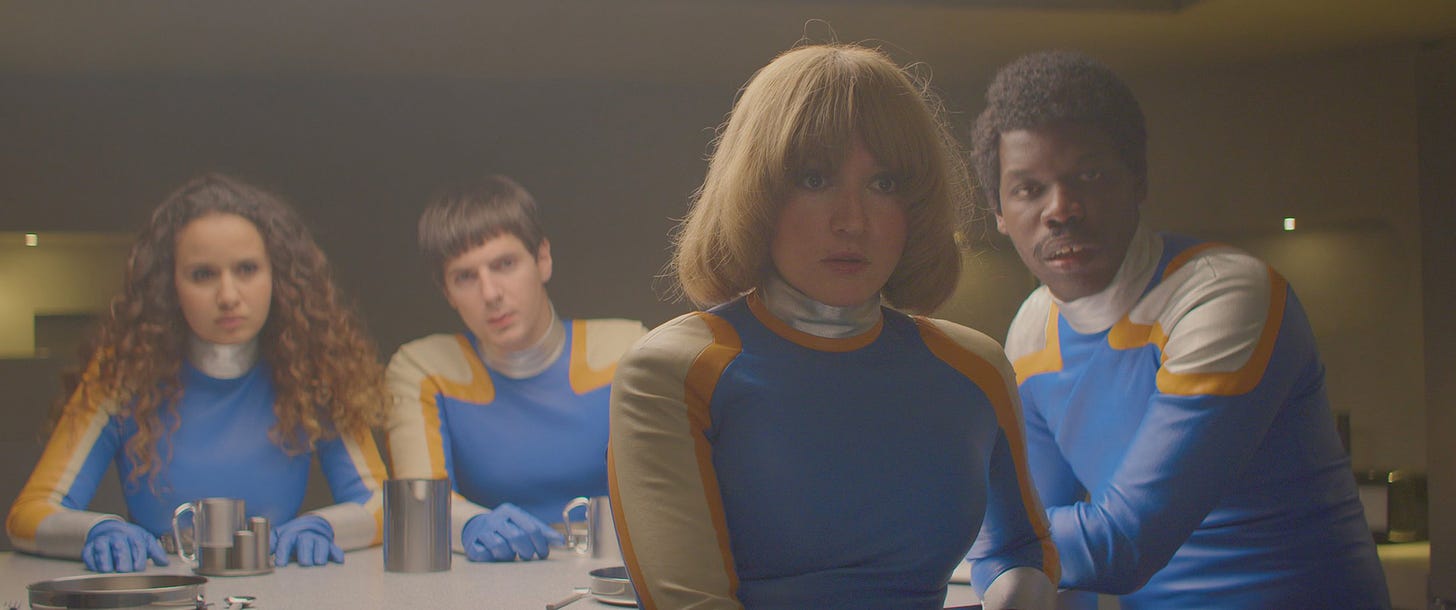
SMOKING CAUSES COUGHING [Fumer fait tousser]
(now in limited release and on VOD)
While Quentin Dupieux always operates in the realm of absurdity, he generally does so with a strong narrative base. His characters find or want some impossible thing and they react accordingly for hijinks, metaphysical ruminations, and surreal insanity. That’s not the case with his latest SMOKING CAUSES COUGHING. Here there’s merely a premise with which to springboard off—a narrative device manufactured in such a way that he can throw multiple short-form ideas against the wall and not have to worry which stick. Because not sticking is the point. Each vignette is a distraction. A lark. Dupieux writes his characters as vessels to tell wild tales, each one an excuse to create an anthology of bloody laughs that we assume didn’t quite have the legs to become full-fledged features themselves.
As a result, of the six of his films I’ve seen, it’s definitely the slightest. That doesn’t, however, mean it’s any less entertaining. It can’t be with a bonkers template bolstered by even more bonkers interludes. The whole is a campier riff on the already campy MIGHTY MORPHIN POWER RANGERS conceit with a quartet of heroic avengers fighting giant plastic monsters in desolate areas via their conjoined power of causing cancer. That’s right. Benzene (Gilles Lellouche), Nicotine (Anäis Demoustier), Ammonia (Oulaya Amamra), Mercury (Jean-Pascal Zadi), and Menthol (Vincent Lacoste) each have the ability to emit a cancerous cloud of smoke from their fists to jumpstart an explosively malignant death in their enemies. They’re an anti-smoking billboard in action, killing alien creatures like Tortusse with the same chemicals Big Tobacco pumps into smokers.
And yet it’s all a red herring. It’s a vehicle towards adding gory, R-rated viscera to kid show battles and spoofing the goofy sci-fi environments the genre wields. Because despite meeting the Tobacco Force in the throes of victory, not all is well within their ranks. Their Chief (Alain Chabat’s grotesque rat puppet Didier) has run the numbers and found a mounting discord that could risk catastrophe. So, he sends them on a work retreat to an isolated lake spot with a live-in staffed supermarket fridge (Marie Bunel) and titanium beds. Throw them all together for a week with their egos, insecurities, sexual desires, and longing for family and things could get heated if not for an unplanned imperative to also tell scary stories—a task none of them are good at when being weird comes much more naturally.
Cue “The Thinking Cap” with Doria Tillier, Adèle Exarchopoulos, Grégoire Ludig, and Jérôme Niel or “Nephew in a Bucket” with Blanche Gardin and Anthony Sonigo. Even a little girl arrives to depress everyone with a brief interlude about mankind’s pollutive greed—the most obvious hint at Dupieux consciously injecting his film with timely and relevant commentary despite its bizarre packaging allowing you to simply watch and laugh. With talking fish, suicidal robots, and rodent lotharios, the latter is ultimately the path of least resistance. And why not? Dupieux isn’t standing on a soapbox. He’s merely bringing reality into his darkly imaginative chaos. If you learn something from Benzene and Menthol’s satirical rejection of “woke-ness” and faux allyship respectively or a young boy’s unhinged fanatical allegiance to superheroes at his own peril, even better.
- 6/10
SPACE ODDITY
(now in limited release and on VOD)
Alex McAllister (Kyle Allen) is going to Mars to become one of the red planet’s first colonizers and he couldn’t be more ecstatic. His family is too—but for different reasons. Where Alex can’t wait to give his life meaning, Jane (Carrie Preston) and Jeff (Kevin Bacon) are simply happy to see him going outside on his own after self-isolating inside pretty much every day since his older brother’s tragic death. So, how could they not help facilitate this development? Especially since Kyra Sedgwick’s directorial debut SPACE ODDITY, written by Rebecca Banner, isn’t a science fiction film. To his parents, accepting the impossible is an unorthodox form of therapy. To Alex, however, it’s his reality. No matter how many times he’s told the private sector organization that recruited him is scamming the public for profit, he continues to prepare for its one-way mission and guaranteed oblivion.
Except, of course, that the moment it finally becomes real (he’s been officially announced despite there still being no word on when—or if—training will commence) is the moment he finally realizes there might be some value left on Earth after all. It’s not his parents, their farm, or his sister (Madeline Brewer’s Liz). It’s the woman charged with figuring out whether dying on another planet is something for which her uncle’s firm can underwrite a life insurance policy. Daisy (Alexandra Shipp) finds the whole thing to be some grand lark like everyone else, but she can also play along because she just moved to their small town and isn’t aware of how Alex’s brother’s death truly affected the family. The more “real” the Mars mission gets, however, the more detail Alex provides with their romance blossoming. And the more worried the McAllisters become in thinking they let him embrace this fantasy for far too long.
It’s a cute dramedy with effective performances. (Although I’d question casting Simon Helberg as a Russian farmhand simply because of the USA vs. Russia space angle, I guess? There’s no need for him to be a foreigner and have to fake an accent.) The script doesn’t quite get to the survivor’s guilt and grief aspect as quickly as you might expect, but I don’t think it derails anything since that knowledge is being revealed to us at the same speed as it’s being revealed to Daisy. The question is therefore whether Alex will be able to see through his emotions and suicidal ideation to fully comprehend the permenance of his decision. Yes, it’s something he must discover on his own, but his family (Bacon and Preston each get a memorable scene to let their characters have their own catharsis) and Daisy can also help push him there. And what the film lacks in narrative surprises, it more than compensates with heart.
- 6/10
TETRIS
(now streaming on AppleTV+)
While it’s based on a true story, Jon S. Baird’s TETRIS is still all about entertainment. You don’t have Noah Pink write a climactic car chase through Moscow that rivals a BOURNE film insofar as its crazy maneuverings onto curbs and through cross traffic if your goal was verisimilitude (regardless of whether some version of the scene did actually occur). And since Henk Rogers and Alexey Pajitnov are both producers on the film (along with the former’s daughter Maya, who took over as CEO of their Nevada-based company), it’s probably easier to think of this adaptation as an anecdote over drinks. Because bringing the game to the world was surely a harrowing experience considering life behind the Iron Curtain then. But embellishment and fantasy can’t help poking their way in too.
The whole plays like a BRIDGES OF SPIES sibling directed by Adam McKay. It’s fast-paced and at times absurd with Rogers (an always game Taron Egerton) doing whatever it takes to put his comparatively modest hat in the ring despite his direct competition being Robert (Roger Allam) and Kevin Maxwell (Anthony Boyle). The one thing this programmer-turned-salesman has going for him is likeable charm. Where Kevin is demanding people call him “Mr. Maxwell”, Henk is sneaking into Nintendo of America to crack jokes and make certain anyone dealing with him knows he isn’t trying to pull a fast one—at least not one that will leave them in the lurch. He simply wants a cut. He wants what his expertise earns. Because if any part of this tale is true, it’s certainly that Rogers knew nothing about Soviet politics.
It’s why a line by Alexey’s (Nikita Efremov) wife (Ieva Andrejevaite) is so good. When Henk clandestinely comes over for dinner, she turns to her husband and admits that the American is “dumb but honest.” Those words work to describe the film itself since the fun of it all never undermines the pertinent facts of what went down. Because people were trying to fleece Pajitnov and his government-watched computer sciences employer ELORG (led by Oleg Stefan’s Belikov). The Maxwells and middle-man Robert Stein (Toby Jones) knew the game and knew they could finagle their way into underselling the USSR to maximize their own profits. It leads to more examples of Rogers’ ignorance of the situation when he flies to Russia under risk of arrest to unwittingly educate Belikov and the KGB (Igor Grabuzov’s Trifonov) about just how shady things had become.
That this international ordeal bringing in Nintendo big wigs (Ken Yamamura and Ben Miles), an unsuspecting translator (Sofya Lebedeva), and the might of capitalist and communist entities in search of windfalls alike might have played a major role in the fall of the USSR is the real draw. Even if the film is also embellishing that aspect, it doesn’t negate the fact that this was a volatile moment when something as apparently simple as a videogame could legitimately stand-in for the entire concept of intellectual property and political power as it concerns a nation in flux. The licensing rights to publish Tetris becomes akin to government secrets with multiple agents seeking the upperhand to literally and figuratively steal it from the KGB’s grip. So, of course its retelling is a bit silly. Laughing is surely the only way Rogers could sleep considering just how close to death he probably came.
- 7/10
Cinematic F-Bomb -
Even Robert Redford’s one-man-show ALL IS LOST got a PG-13 f-bomb. (Substack apparently can’t handle an embedded gif, so you’ll have to click over for a smoother experience. Or see everything at cinematicfbombs.com.)


New Releases This Week:
(Review links where applicable)
Opening Buffalo-area theaters 3/31/23 -
AN AMERICAN WEREWOLF IN LONDON [1981] at North Park Theatre
BHOLAA at Regal Elmwood
DASARA at Regal Elmwood & Transit
DUNGEONS & DRAGONS: HONOR AMONG THIEVES at Dipson Capitol, McKinley Mall & Flix; AMC Maple Ridge & Market Arcade; Regal Elmwood, Transit, Galleria & Quaker
HIS ONLY SON at Dipson Capitol; AMC Market Arcade; Regal Elmwood, Transit, Galleria & Quaker
MUMMIES at Regal Quaker
SPINNING GOLD at AMC Market Arcade; Regal Elmwood, Transit, Galleria & Quaker
A THOUSAND AND ONE at AMC Maple Ridge; Regal Elmwood & Quaker
Opening Buffalo-area theaters 4/5/23 -
AIR at Dipson Amherst, Capitol, McKinley Mall & Flix; AMC Maple Ridge & Market Arcade; Regal Elmwood, Transit, Galleria & Quaker
THE SUPER MARIO BROS. MOVIE at Dipson Capitol, McKinley Mall & Flix; AMC Maple Ridge & Market Arcade; Regal Elmwood, Transit, Galleria & Quaker
Streaming from 3/31/23 -
BLACK CLOVER: SWORD OF THE WIZARD KING - Netflix on 3/31
KILL BOKSOON - Netflix on 3/31
MONUMENTAL: ELLIE GOULDING AT KEW GARDENS - Freevee on 3/31
MURDER MYSTERY 2 - Netflix on 3/31
RYE LANE - Hulu on 3/31
TETRIS - AppleTV+ on 3/31
Thoughts are above.
THE UNHEARD - Shudder on 3/31
EAR FOR EYE - Criterion Channel on 4/1
PRETTY BABY: BROOKE SHIELDS - Hulu on 4/3
JAIME - MUBI on 4/5
Now on VOD/Digital HD -
AVATAR: THE WAY OF THE WATER (3/28)
CHAMPIONS (3/28)
DOS ESTACIONES (3/28)
SISSY (3/28)
“They're moving their plot forward to its bloody conclusion and allowing the messiness of the message to be their sacrifice for fun. It's not a perfect compromise, but it does do the job.” – Full thoughts at The Film Stage.
THE SON (3/28)
“Because THE SON, much like Jackman's Peter, is devoid of personality. It's just scene after scene of "Afterschool Special" dialogue with zero room to let any of the actors breathe.” – Full thoughts at HHYS.
ACIDMAN (3/31)
Thoughts are above.
SPACE ODDITY (3/31)
Thoughts are above.





